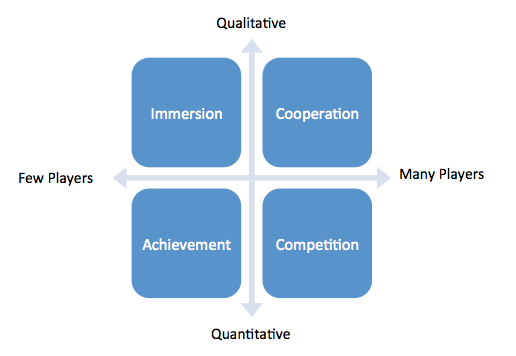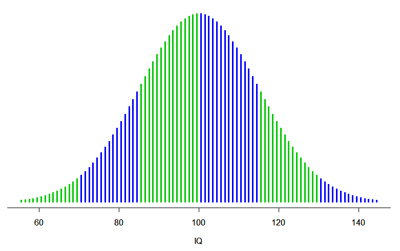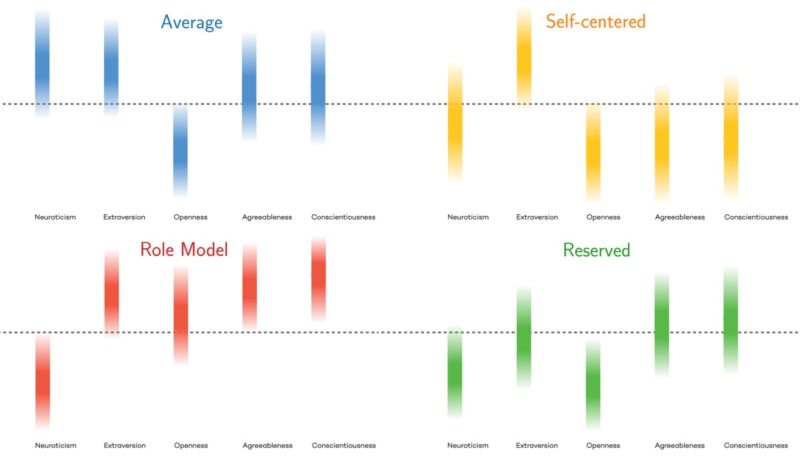PERSONAL
2,870
Gamer Psychology, and Openness
6 years ago
We all play games for different reasons. Some psychologists have attempted to categorise different players based on their preferences, and I think it's worth talking about them - and the personality trait Openness (to Experience) - to explain some of the aversions to the projects I'm trying to make.
Honestly, some of the recent comments have been discouraging. Or rather, the same comments keep coming up on every new post, and what's discouraging is the persistence and volume. "Nobody will like your stupid emotions thing because I don't!", "just make MARDEK exactly like I remember it otherwise anything else you make will just fail!"
A big part of that is just attachment to the past, surely. An impressionable child is more likely to be positively influenced than a jaded adult. It's not that MARDEK appeals to many people now because it's good, it's because they encountered it when they were younger and less critical, and assume - probably correctly - that something novel wouldn't move them in the same way. Of course it wouldn't, you're older now. Life's wonder has been drained by experience. It's a shame that that's the case, but it surely plays a factor.
I'd love if people were open to new things despite that, but I also know that there are psychological factors that make some individuals more inclined to that than others.
![]()
Some psychologists have attempted to categorise gamers according to what they seek and enjoy in games. One, Richard Bartle, came up with
∞ a system with the following four categories ∞ (I find the card suit abstractions really pleasing):
Clubs or
Killers prefer action, dominance, immediate sensory pleasure; genres like FPS would be most appealing to these, and they're bored by having to wait and take turns. They play games for the thrill of causing immediate visceral effects; they want power.
Spades or
Explorers want to engage their mind, to think, to understand details; they're the sorts of players who'd read every in-game lore book and come up with complex, cognitively-oriented strategies. They play games for the mental immersion; they want knowledge.
Diamonds or
Achievers want to accumulate resources or rewards for their accomplishments, as in-game Achievements, loot, impressive stats, etc. They play games to conquer them; they want trophies.
Hearts or
Socialisers are interested in forming connections with others. While most of the writing about this speaks of them in terms of making real-world connections with other players - as in MMOs, etc - I'd add that it also applies to solitary players who want to be emotionally moved by the game's story or characters, who'd go out of their way to talk to every NPC and who'd never skip a bit of dialogue. They play games to *feel* something; they want emotional involvement.
The categories are not mutually exclusive. There's
∞ a test ∞ which gives your results in terms of percentages for each one, which add up to 200%; I got
80% Explorer, 80% Socialiser, 33% Achiever, and 7% Killer, which feels about right and is probably essentially the same as when I did this same test years ago. Like all psychometric tests, it's imperfect, and some of the questions can be irritating - I often had to essentially choose between "would you rather someone punch you in the face or spit in your face?" - and it applies primarily to online multiplayer games, but it is what it is.
![]()
There's another, different system by Jon Radoff, which uses the following quadrants:
![]() Immersion
Immersion here is described as "storytelling, practising theory of mind, adopting new viewpoints, imagining cause and effect, recognising new patterns, appreciating beauty".
Achievement is essentially "mastering skills".
Cooperation is "altruism, coordination, coalition-building, grouping".
Competition can be "for attention, for resources, for recognition, for physical dominance, mates, etc".
Beyond that, I haven't read much more about that, but it seems fairly straightforward. Immersion and Cooperation are most interesting to me, so what I make to appeal to those aspects of my own psychology won't appeal to someone who prefers Achievement and Competition.
![]()
The description of Immersion there sounds very similar to a description of
Openness (to Experience), my favourite of the Big Five personality traits, which I've mentioned a few times before since I feel it's the primary motivator for my creative work, and the primary point of contention when it comes to people sharing my excitement about it.
∞ Here's a simple (if not exactly scientific) test for Openness ∞, which at the very least gives you an indication of the qualities that it includes.
I did it, and (shockingly) got told my Openness is "very high". I already knew that, but here's the description that it gave me anyway since it helps to explain what Openness is if you don't already know:
Your overall score for Openness is very high. This indicates you are more likely than most to be interested in abstract ideas and to enjoy artistic and intellectual pursuits.
People who are high in Openness are intellectually curious and usually have an interest in the arts and sciences. They often think in symbols and metaphors and notice patterns. They look beyond the facts and pursue a higher level of understanding.
As a person high in Openness, you are likely to be creative and enjoy playing with ideas. You are probably interested in abstract concepts and enjoy intellectual disciplines like mathematics, science, language, music, and the visual and performing arts.
You may consider yourself adventurous and probably enjoy exploring new things. You may get bored with the routine and mundane, preferring instead to seek out environments that stimulate your mind. You are likely politically liberal and open to new and unconventional ideas.
Openness is correlated with intelligence, but only modestly. Openness is best thought of as an attitude of intellectual curiosity, and does not necessarily indicate intellectual capacity.
It also has several facets, all of which I also scored 'high' on here, but I think a simple (and probably not scientifically valid) psychometric test like that isn't sufficient to say anything very meaningful. Even so, I feel that quoting them here will be valuable, not in a boasting "look how great I am!" way or anything, but just to better explain the kind of mind that's making the decisions behind these games, and why they are what they are:
Imagination
To imaginative individuals, the real world is often too plain and ordinary. High scorers on this scale use fantasy as a way of creating a richer, more interesting world. Low scorers on this scale are more oriented to facts than fantasy.
Artistic Interests
High scorers on this scale love beauty, both in art and in nature. They become easily involved and absorbed in artistic and natural events. They are not necessarily artistically trained nor talented, although many will be. The defining features of this scale are interest in, and appreciation of natural and artificial beauty. Low scorers lack aesthetic sensitivity and interest in the arts.
Emotionality
Persons high on Emotionality have good access to and awareness of their own feelings. Low scorers are less aware of their feelings and tend not to express their emotions openly.
Adventurousness
High scorers on adventurousness are eager to try new activities, travel to foreign lands, and experience different things. They find familiarity and routine boring, and will take a new route home just because it is different. Low scorers tend to feel uncomfortable with change and prefer familiar routines.
Intellectual Interests
Intellectual and artistic interests are the two most important, central aspects of openness to experience, as they examine a person's tendency to enjoy abstract ideas.
High scorers on this facet love to play with ideas. They are open to new and unusual ideas, and like to debate intellectual issues. They enjoy riddles, puzzles, and brain teasers. Low scorers prefer dealing with either people or things rather than ideas. They regard intellectual exercises as a waste of time.
Intellectual Interest should not be equated with intelligence. This facet of personality describes an intellectual style, not an intellectual ability.
Liberalism
Psychological liberalism refers to a readiness to challenge authority, convention, and traditional values. In its most extreme form, psychological liberalism can even represent outright hostility toward rules, sympathy for law-breakers, and love of ambiguity, chaos, and disorder. Psychological conservatives prefer the security and stability brought by conformity to tradition. Psychological liberalism and conservatism are not identical to political affiliation, but certainly incline individuals toward certain political parties.
This doesn't touch on spirituality - as an interest in the abstract beyond rather than, say, rote church attendance - which I'd say from a lot of exploration is strongly associated with Openness. Interestingly, individuals' Openness scores show measurable and permanent increases following highly influential spiritual experiences, such as Near Death Experiences, or so I've read.
If you've ever worked with any kind of statistics, you're probably familiar with the bell curve, or normal distribution:
![]()
A lot of statistics will fall into this distribution, where most individuals fall somewhere in the middle, and those who fall towards the edges are increasingly a minority the further they are from that middle point. This one's for IQ; geniuses and complete morons are equally as rare.
The Big Five personality traits could each be thought of as spectra. So for example you're not "either an extrovert or an introvert"; it's more like on a scale of 0%=introvert to 100%=extrovert, you fall somewhere in the middle, with about 50% being the average. This isn't accurate exactly, and it seems like every study gives different and complex distributions of the personality traits, especially since studies typically measure "how [some variable] correlates with Big Five traits" rather than just their frequency. But there are all kinds of issues with measurement, especially with self-assessment (people choosing things that make them look or feel good - "well I've never done anything artistic in my life, but I'm not a
philistine, so sure, I'll select 'I have artistic interests'!" - for example, or simply lacking an understanding of how they compare to others since they can't directly experience other minds), so it's not as if we can
really measure anyone's personality traits in the same way that we can measure, say, their height. As such, while it's not perfect, it's not useless to think of them as basic bell curves.
In regards to Openness, I'm probably at least two standard deviations from the mean, in that blue section on the right of that graph. That means that I'm a minority, and by appealing to my own mind, I'm not appealing to the majority. So people who speak as if 'most people' won't like what I make probably aren't wrong.
Still, I really don't want to try to appeal to the lowest common denominator, the simple-minded Everyman who delights in smacking around monsters to distract himself from the daily grind. Perhaps that won't lead to much money, but the spiritual satisfaction I'd get from making something I'm truly proud of, rather than making something I don't believe in purely as a cash grab, would make up for that, I feel.
Important:
It's not
bad to be 'low' in openness, just as it's not 'bad' to be low in extraversion. Though of course it depends on what you're trying to do. High openness would be a boon for an artist and a hindrance for most walks of life. But it depends on what you mean by a boon. For me, openness inspires me to new ideas, which I find fulfilling in some internal, spiritual sense... but which is obviously getting in the way of just buckling down and making a faithful MARDEK remake, which would (possibly) earn me money. High openness means flightiness and constant intellectual movement; it's why I've started and abandoned so many projects, and why I'm always drawn to novelty and feel unbearably trapped by the very idea of spending years on something I've moved beyond. Someone with lower openness wouldn't have these impulses holding them back. They'd stick steadily with what worked and be more successful in the world because of it, even if what they were doing wasn't revolutionary.
![]()
While doing a bit of reading about this (not as much as I'd like since I don't have the time), I came across
∞ some ∞ ∞ articles ∞, which talk about research that found that trait distributions tend to cluster in four common 'types'. That is, everyone has different 'stat values' for each of their personality traits, but some of the distributions (eg high-high-low-med-high) are notably more common than others. The four common clusters that emerged were:
![]()
(Image uncomfortably stolen from
∞ this article ∞; maybe I should try to make my own?)
Average - high neuroticism and extraversion, low openness, and medium agreeableness and conscientiousness. Most common overall.
Self-Centred - high extroversion, medium neuroticism, along with low openness, agreeableness and conscientiousness. Most young males fall into this category.
Role Model - low in neuroticism and high in all the others (extraversion, openness, conscientiousness, agreeableness). More common in older people, especially women. The 'ideal personality' (hence 'role model').
Reserved - low neuroticism, openness, and extraversion, moderate agreeableness and conscientiousness.
This isn't really surprising considering lived experience; this 'average' category does sound a lot like my existing conception of an 'ordinary person'. Most gamers will be young males, and most of them, just considering these categories, are likely to be either of these "self-centred" or "average" 'personality stat builds', with low openness.
I'm probably one of the weirdos who doesn't fall into those four common 'type' categories (I'm high in neuroticism, openness, and slightly less high in agreeableness, low in extraversion, and medium (at best) in conscientiousness). You might not fit any either; they're more common than other distributions, but that doesn't mean everyone would be one of them.
Interesting that openness seems low across the board, and extraversion is high. No wonder I've never fit in.
![]()
The point I'm trying to make with all this is that we're all different, we all want different things. The games I'm aiming to make would contain a lot of appeal to people who share my preferences, which aren't unique to me, but it's understandable that someone who plays games for different reasons wouldn't be as interested.
It might be valuable to look at your own mind to understand why what I'm doing isn't what you might want, if you're one of those people... though perhaps the same lack of Openness that's responsible for that mentality also makes people disinclined towards introspection and/or psychological analysis?
I don't know. I also feel that at least some people might reply with "well I scored the same as you but I still think your ideas are bad so BLUUUH!" as a dominance thing, because that's a thing people do.








0